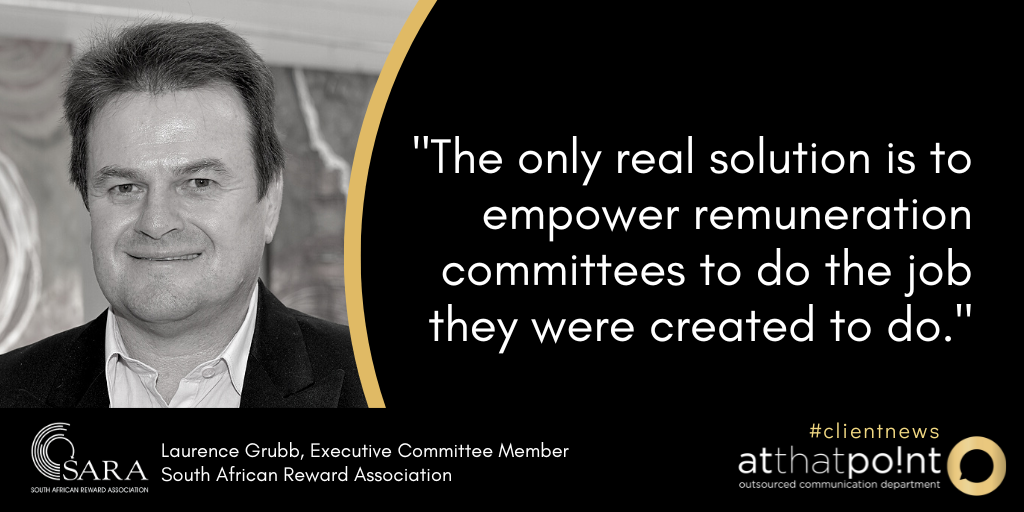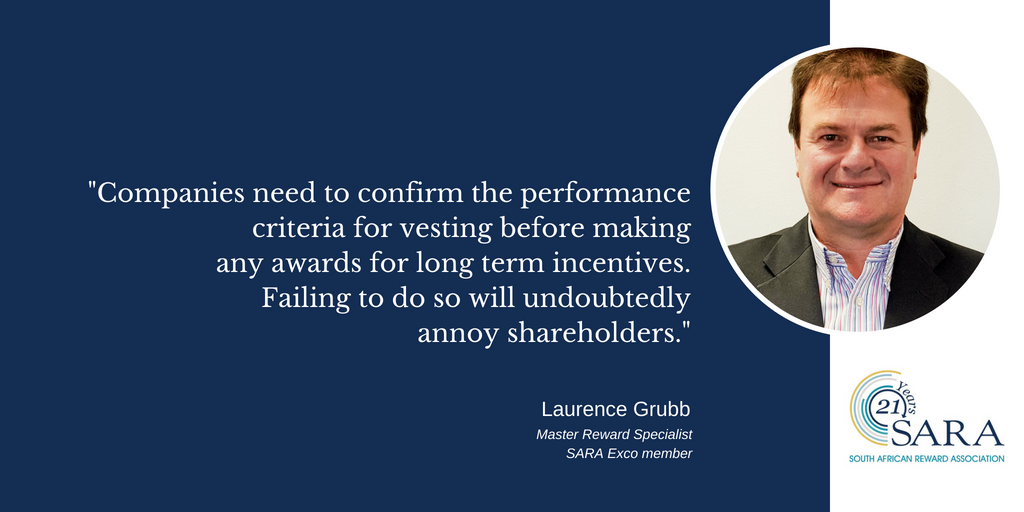 Stronger remuneration committees are the solution to rampant executive pay. This is according to Laurence Grubb, Master Reward Specialist and Executive Committee Member at the South African Reward Association (SARA). "We're seeing an imbalanced power dynamic between high-performing executives who associate significant rewards with the value they deliver and RemCos with structural expertise gaps that cannot assertively counter their demands," he says. Grubb suggests that alternative remedies are likely to do more harm than good. The danger of a binding vote The majority of South African businesses try to abide by the King IVTM code of corporate governance to achieve balanced and appropriate outcomes for executives, shareholders and other stakeholders. Yet, some CEOs, CFOs and executives continue to extract excessive remuneration from their companies. However, they have often built the enterprise from scratch or led it to significant growth, making them key to their company's success. So they may control the balance of power with a Board and Remco not willing to cross them. One suggested approach is to afford shareholders a binding vote that could deny gratuitous executive rewards, but Grubb says this is risky. "These leaders are the drivers of the business's growth and if their expectations are not met, they could move on and leave the Board to find a suitable successor, the impact of which will normally be a decline in the share price" says Grubb, noting that similar scarce talent might be impossible to find. Consequently, shareholders may end up shooting themselves in the foot. Rethinking the RemCo A better solution is to equip the RemCo with the necessary expertise to rationalise, negotiate and even restructure proposed packages in a way that satisfies of all parties. This requires that the committee augments its competencies with a deeper knowledge of current remuneration trends, industry standards and competitive best practices. To facilitate this solution, SARA is developing masterclass webinars and live sessions aimed at RemCo members, as well as other executive and non-executive directors, to enhance their understanding of executive remuneration. In addition, King IV suggests that the committee invites an external advisor to guide it in its duties. Executives will often hire remuneration consultants to help them determine the highest reward opportunities for their position. Their justification for greater compensation will be informed by data, industry benchmarks and practices and broader insights. RemCos without similar independent expertise will be left at a disadvantage. "In an ideal world, King IV might recommend a Master Reward Specialist as a standing member in all RemCos, allowing them to bring remuneration expertise, independent views and industry best practices to the negotiation," says Grubb. A real solution While most South African businesses have roped in runaway executive earnings, some executives continue to enjoy astronomical rewards. Many proposed solutions – like more onerous regulations or a binding vote for shareholders – may have unintended consequences which would prove to be negative in the long run. "The only real solution is to empower remuneration committees to do the job they were created to do," says Grubb. Most of all, they must be able to challenge the CEOs and executives who, up to now in some companies, have retained the balance of power in their struggle for greater rewards. ENDS MEDIA CONTACT: Rosa-Mari Le Roux, [email protected], 060 995 6277, www.atthatpoint.co.za For more information on SARA please visit: Website: www.sara.co.za Twitter: @SA_reward LinkedIn: South African Reward Association Facebook: SARA – South African Reward Association
0 Comments
Recent reports of shareholders voting against executive remuneration structures have again highlighted the need for increased transparency in the disclosure of not only the amounts paid, but how the amounts were calculated and the link to performance. Many companies have made significant progress with the disclosure of executive pay and the quality and content of remuneration policies and implementation reports.
However, the improved transparency of certain excessive executive pay packages has also fuelled the perception that all executives are paid exorbitant amounts of money, causing an ever increasing pay gap. Laurence Grubb, Master Reward Specialist and executive committee member of the South African Reward Association (SARA), says a handful of executives are still able to manipulate remuneration committees, despite notable efforts to follow the principles set out in King IV and the association’s guidelines. Committees agree to targets which are a little too soft or potential remuneration that is out of line with industry. “Although these executives are in the minority, it remains a concern and needs to be contained.” Independent advice needed Grubb says remuneration committees should be entitled to obtain independent advice from their own remuneration consultants to validate what has been presented to them by the executives. The cost for this service should be borne by the company. SARA published guidelines on the drafting of a remuneration policy and the implementation report at the beginning of the year which follows the principles set out in King IV. Some ‘old’ long term incentive schemes may have awards which were not linked to performance. Those shares may now be vesting, and with no performance linked to them, it is quite possible that shareholders will vote against such schemes. Grubb says companies need to confirm the performance criteria for vesting before making any awards for long term incentives. Failing to do so, will undoubtedly annoy shareholders. Barclays Africa experienced this first hand when shareholders voted against the company’s policy and implementation report earlier this month (May 2018). In terms of the King IV principle on remuneration, the policy should record the measures that the board commits to when 25% of the votes are exercised against either the remuneration policy or the implementation report, or both. These actions should then be communicated in the background statement in the following year. South Africa is the only country in which the threshold for these remedial measures is as low as 25%. In Australia, the UK and Belgium, among others, remedial measures are only mandated if 50% or more of the votes are cast against the remuneration policy and implementation report. Pay gap realities The pay gap in South Africa remains a burning issue, although companies have been trying to address it by offering larger annual increases for lower level workers and smaller increases at executive level. However, an increase of 5% on R2 million will always make a bigger gap than 8% on R100, 000. Several companies have also introduced the minimum wage, and in some instances, wages which exceed the minimum wage. In countries where the pay gap is much narrower, the level of skills, education and productivity of the lower end workers are much higher than in South Africa. Grubb says companies operating in those countries are typically able to pay much higher rates to their lower level employees because of the higher skills and productivity levels. “Unfortunately, in countries where education is severally limited and not at the right standard, the impact is felt mostly by those whose skills and level of education do not offer them the opportunity to increase their earning potential.” Companies find it difficult to continually pay higher salaries to lower levels and, inevitably where that does happen, there are job losses.  Government involvement in executive remuneration will have unintended consequences, says Laurence Grubb, Executive Committee Member at the South African Reward Association (SARA) and Managing Director at Khokhela Consulting. Executive pay is a perennial hot topic in today’s media, particularly in the context of growing inequality. Unsurprisingly, it has found its way into governance codes like the King Report. There is even talk of governments getting involved in regulating executive pay, presumably in the interests of social cohesion. Whatever the reason, government involvement in what is a private, corporate matter should be vigorously resisted; shareholders have invested their money in a company and it is they who should be controlling how its executives are rewarded, and thus incentivised to perform. In cases where governments have attempted to intervene they have backfired. In the wake of the 2008 financial crisis, the European Union imposed a cap on bonuses for bankers. Banks simply increased the guaranteed pay and/or created a new category of variable pay called an “allowance” rather than a “bonus”. This has negatively affected the desired link between performance and reward. Indeed, corporate governance codes and practices are leading to better solutions to the challenge. While they are perhaps not yet perfect—and may perhaps never be—considerable progress is being made as the business world builds up experience in this area. At the outset, it is perhaps worth noting that the common view that all executives are overpaid is simply not true. In fact, many remuneration committees are creating and implementing good remuneration policies which consider all stakeholders. Companies are in business to make a profit, so overpaying executives is hardly likely to appeal to them. So what are the current developments in corporate governance aimed at refining remuneration? And what are the issues? Perhaps the biggest trend—evident in King III and judging from the draft in the King IV™ Report on Corporate Governance for South Africa 2016 issued by the Institute of Directors Southern Africa—is the concept of a shareholder vote on both the remuneration policy and its implementation. There are many variations. In Australia, for example, if a corporate remuneration policy receives a lower-than-75-percent vote at three consecutive AGMs, the board is forced to resign. The most common pattern is for the remuneration policy to be subject to a vote at intervals (two- or three-year intervals are common), with the implementation of the policy the subject of an annual vote. Obviously, it is impossible for the implementation vote to be binding—in the very nature of things, employment contracts cannot be delayed until the AGM. However, the question of whether the vote on the remuneration policy should be binding or not remains moot. The King approach has been to make it non-binding, but to make it a requirement for companies to “engage with” those who voted against the policy. It might seem that a binding vote on the remuneration policy makes sense, but there is always the risk that a group of minority shareholders could use the vote to further another agenda by effectively expressing a lack of confidence in the board. It may also not necessarily be an effective way to curb excessive executive pay: Switzerland has such a binding vote on remuneration policy, but its CEOs are the best-paid in Europe. While we do not yet know what the final recommendations of the King IV™ Report, due to be released by the Institute of Directors in Southern Africa on 1 November 2016, will be, it seems certain that South Africa will remain loyal to the principle of a non-binding vote on remuneration policy, probably every two years, but with an obligation to deal with shareholder concerns. On balance, this seems sensible because it keeps the door open to a negotiated solution. To conclude though, one must highlight a potential issue when it comes to the effectiveness of shareholder voting on such important issues. This is that the bulk of shareholder votes are controlled by third parties, the huge institutions who invest on behalf of individuals. They are often short of resources that are required to analyse policy issues carefully, and they are also not directly concerned with the company in the way that the original type of shareholder was. The original link between the provider of the funds, the board as an agent for the funder and the executives has therefore stretched to the point where some creative thinking is required to bridge this gap. This caveat aside, governance standards built on consensus and best practice are most likely to yield results, while regulatory intervention will simply be counterproductive. ENDS MEDIA CONTACT: Cathlen Fourie, 082 222 9198, [email protected], www.atthatpoint.co.za For more information on SARA please visit: Website: www.sara.co.za Twitter: @SA_reward LinkedIn: South African Reward Association Facebook: SARA – South African Reward Association Establishing the parameters of executive compensation within an organisation is a complex task. The board needs to craft a package which is in line with business strategy and performance and which is of significant value to the executive, or there is a risk that value is lost by both. Compensation is a tool which can be managed to align company success with executive deliverables so as to benefit the bottom line and inspire business executive performance.
Reward expert, Laurence Grubb, Exco member of the South African Reward Association (SARA) explains: “There are three basic types of long term incentive schemes which align shareholders and executive interests and work best over a period of between three to five years.” Performance share/unit scheme This type of scheme offers the executive shares or ‘full value’ units which are linked to the value of the company. The total value of the shares or units offered is aligned to the value of the executive’s package. When these vest (become available to the executive), the performance of the company is compared to the performance objectives set at the time they were offered and this determines the number of shares or units that vest and the executive receives the full value. “The executive is therefore driven to improve the share price or unit value and to ensure the company meets or exceeds the performance objectives set,” explains Grubb. Share option/appreciation unit/rights scheme This is similar to the previous scheme but instead of full value units, the executive is offered options/units/rights where they benefit from only the growth in the value. So they only receive the difference between the value at vesting and the value at commencement. There may be performance objectives attached to the vesting or a hurdle, such as a minimum level of company performance, below which nothing vests. These schemes should ignite executive commitment as benefits are closely tied to the success of the business. “The challenge with this type of solution is that the share price can be impacted by factors outside of the executive’s control and it can be tricky to set the performance measures today for market conditions and organisational objectives in three to five years,” says Grubb. Share Purchase Schemes “The third type of scheme aligns executive interest with shareholder interest. Executives are asked to invest their own money into shares so they are completely engaged with the shareholder vision.” “The ways in which the schemes are structured depend on who the shareholders are and what they prefer, the executives and the expertise within,” says Grubb. “Some companies have their own reward departments with specialists on board to advise them. In other instances executives seek the expertise of outside consultants on how best to construct and manage their packages. In both cases it is essential that the final package align with company strategy and ensure executive buy-in.” “Linking incentive to reward and reward to performance is an art form and many companies and reward specialists spend a good deal of time and effort in identifying and implementing the best solutions for their business,” concludes Grubb. “You need to define performance and establish which measures – financial and other – evaluate that performance. Companies need to be focusing on making sure that performance criteria are well-defined and that they are as relevant in five years as they are today.” ENDS MEDIA CONTACT: Cathlen Fourie, 012 644 2833, [email protected], www.atthatpoint.co.za For more information on SARA please visit: Website: www.sara.co.za Twitter: @SA_reward LinkedIn: South African Reward Association Facebook: SARA – South African Reward Association  Laurence Grubb was recently speaking at the SARA conference, sharing 4 solutions to address the key concerns voiced by shareholders. Laurence Grubb was recently speaking at the SARA conference, sharing 4 solutions to address the key concerns voiced by shareholders. Shareholders are as likely to vote against remuneration resolutions if they consider disclosures to be incomplete as they are in the face of excessive pay. “Clear and precise disclosure of reasons for remuneration decisions is essential for shareholders to decide their vote, and companies need to ensure that the required detail is available in simple terms,” advised Laurence Grubb at the annual conference of the South African Reward Association (SARA), held on 5 and 6 November at Vodacom World in Midrand. Remuneration policies are created, inter alia, to attract and retain the best executive talent. Balancing this objective with shareholder demands requires a clear understanding of a number of factors considered by shareholders in determining their votes. Grubb suggested solutions to address the key concerns voiced by shareholders following a recent study conducted with 40 JSE listed companies by Khokhela Consulting, of which Grubb is the CEO. Be transparent in disclosure of performance targets and measures Actual targets and measures for all incentive schemes need to be clearly defined and disclosed, and must be aligned with the financial strategy and budgets. “We advise that thresholds should be achievable 75% of the time and targets achievable 50% of the time while requiring significant effort,” said Grubb. “Stretch targets should however be set at levels that require impressive effort with results that are achievable 15-25% of the time.” Selection of peer or comparator groups Grubb suggests selecting companies for comparing performance using factors such as revenue, market capitalisation, industry, magnitude and location of operations and reasons for shareholders investing in the company. “Structured remuneration design should align with company strategy and shareholder values and be funded by the additional performance required,” said Grubb. “Incentives should drive performance and encourage retention; it should never be implemented as a stand-alone retention scheme without performance requirements attached.” Report on clawback policy Actions around retrieving monies already paid out due to over incentivising key personnel should be published as part of the remuneration report. This clawback policy should include the detail of adequate procedures to retrieve any or all bonuses should conditions of misconduct, misrepresentation or malus exist. Encourage minimum shareholder requirements for executives Shareholders consider Minimum Shareholder Requirements (MSRs) desirable as it ensures alignment with shareholders’ objectives by having ‘skin in the game’. Through MSRs, executives are encouraged to invest a substantial part of their after-tax bonus in the company, as it reinforces executives’ commitment to the success of the company by sharing the same earnings risks as shareholders. “Irrespective of the contents of a strategy driving a chosen remuneration policy, companies need to remember that timeous disclosures and an increased level of transparency are imperative,” concluded Grubb. Engagement with board members, shareholders and proxy advisors is recommended when key changes are made to remuneration policies. “Timeous transparent disclosure, balanced with keeping competitive information confidential, will lead to an improvement in how shareholders make decisions.” ENDS MEDIA CONTACT: Cathlen Fourie, 012 644 2833, [email protected], www.atthatpoint.co.za For more information on SARA please visit: Website: www.sara.co.za Twitter: @SA_reward LinkedIn: South African Reward Association Facebook: SARA – South African Reward Association |
Archives
March 2023
Welcome to the South African Reward Association newsroom.
Categories
All
|



 RSS Feed
RSS Feed